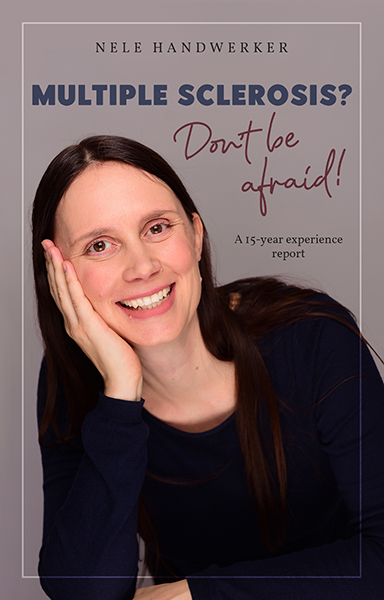Today my interview guest is Tania Pilz from Austria. Tania was born and raised in South America and came to Austria for her studies. She received her MS diagnosis in COVID lockdown in 2020 via telephone.
Her first symptoms appeared when she was twelve years old. Still the diagnosis got additionally postponed as grown up as she waited to be on full insurance which did only happen when she finished university as private doctors are very costly and she couldn’t afford to pay for all the bills on her own.
Soon after, Tania founded the International MS-Community Austria to offer a place to people with MS from minority groups of all different types, not just migration or international background. We are talking about all these different topics and Tanias creative output.
Klicken Sie auf den unteren Button, um den Podcast zu laden.
Table of Contents
Introduction Tania Pilz
My name is Tania Pilz, 31, born in Nicaragua. I grew up in Guatemala and started adulting in Austria. 😉 I am a creative person with a background in marketing and communications. But my soul beats for the creative field; anything that you can create with your own hands or body like painting, handicrafts, singing, dancing …
I am also an MS patient. Since my diagnosis I have been actively advocating for diversity and inclusion in the health care system, especially in the MS community. By this I mean mainly the inclusion of minorities like young people, people with migration background, expats, or as I like to call them “internationals”, the LGBTQ+ community, people from different social and educational background… and and and. Inclusion beyond the ability or disability spectrum – all kinds of people that are very often set aside within the MS community, but who are also affected by Multiple Sclerosis.

Diagnosis and current status
When were you diagnosed with multiple sclerosis and what led to it?
It was my last relapse (and the worst one I have experienced so far) that led to my diagnosis. Before I had started feeling horrible vertigo while on a trip to Portugal. I was going through a very stressful time, at work and personally, and I was pretty much neglecting myself. So, as it always happens, once I finally had some time off, my body starting showing some symptoms of chronic stress. Numbness, tingling, foot drop, vertigo, brain fog, cognitive issues, imbalance, slur speech, insomnia – you name the symptom, I pretty much had all of them.
My diagnosis came on the first two week of the COVID lockdown in 2020. I actually received my diagnosis via phone. Before that I had been coming and going through tests and appointments with my neurologist for over eight months.
Did you have any previous symptoms that, in retrospect, were related to multiple sclerosis?
I have had multiple sclerosis related symptoms since I was twelve years old. It started with cramps and numbness on my arms and face. These symptoms have prevailed throughout my entire MS journey.
I’ve had at least 5 relapses, prior to my diagnosis – three of them have been very prominent. All of them send me straight to the hospital, but unfortunately no doctor took me seriously. They all discarded my symptoms as stress. It was only after someone suggested I might need to see a neurologist, that I took hands into the matter, and decided to go to a private neurologist. (Fun fact, since private doctors can be costly, I decided to postpone my own diagnosis until I was fully out of university and could have a full insurance – two years after that I happened to stumble upon the same neurologist I went on the first occasion. I stuck with him, because he was the first one to take me seriously.)
Looking back, and with the knowledge I have now, I can honestly say there were signs of MS all along. Insomnia, bladder dysfunction, numbness, disbalance, all these symptoms where often tight to stress, but never to a chronic condition.
How were you feeling about the diagnosis and what was it like for your loved ones?
I was relieved. Yes, I was very relieved when I finally had a name to my symptoms, and I could finally treat all of them. My relief didn’t last for too long though. I was blindsided by it, and it soon turned into all stages of grief. Back then I did not take the time to process the whole diagnosis – that was probably my biggest MS regret so far.
My now soon-to-be husband, was and has been with me throughout my entire diagnosis and MS journey. He is the kindest soul I have ever met, and has been supporting me through lumbar punctures, blood tests and medication. I am pretty sure it must be hard on him, on many levels, but he will never let me see a tear or a doubt. In fact, he will always smile and assure me, that together we can get through anything. I will forever be grateful to him for this.
When it comes to MS, it’s my little sister who I always turn to. She has a background in health and worked with MS patients before (what are the odds), so I truly trust her advice. I am happy to have a loving support system that have adapted to my needs and respect my boundaries.
Did you receive any recommendations for disease-modifying therapies at the beginning, and what was your decision?
Yes. Many. All of them overwhelmed me, so I decided to take the one that better fit my lifestyle. Back then I could not see myself going to the hospital every three months for my treatment. Now, that’s my new normal and I’m slowly making peace with it.
Have you had a change in therapy and if so, for what reason?
No. Right now I am in the process of considering other options, but for the moment we are just keeping a close eye to see how my MS develops.
Are you using any symptomatic therapies? If yes, which ones?
No.
How did you adjust your lifestyle after diagnosis?
I now follow my intuition and listen to my body. I cut down on all stress factors, including work related stress, and personal stress factors. I started focusing on the tiny moments of happiness in life, I practice gratitude every day and do my best at keeping up with yoga, meditation and relaxation methods.
What do you think about your future and have your professional and private plans changed?
Yes. I think about the future a lot – but only the right amount so I can keep my anxiety quiet. My perspective on work made a full 365° spin. I no longer define myself by my career or job title, but rather all my personality traits. I now see myself as a purpose-driven creative person, who is figuring her stuff out, every single day.
MS put a lot of situations in my life into perspective, and after reanalyzing my priorities, it made me realize that I was putting too much energy into the wrong places.
What was your rock bottom with multiple sclerosis and how did you fight your way back out?
I hit rock bottom two years ago. Life put me through a series of tests – including my diagnosis – and I unfortunately had to deal with a lot at the same time. I fell into a deep dark whole of anxiety and depression. Accepting that I needed extra help from my family, friends and therapist, was definitely the first step to fighting back.
It wasn’t easy, and it was for sure a painful journey, but a needed one. Healing will never be a lineal process, and I can honestly say I am still dealing with the aftermaths of some traumas. But rather than fighting all the monsters, I decided to live with them.
The next step was taking a career hiatus, and going back to my roots. I started doing more of what makes me happy, such as painting, creating, writing, dancing, gardening… you know, all those little things we all take for granted. Last step was accepting that I am more than a diagnosis, my job or other people’s perception of me.
How are you currently doing with your MS?
FINE. If you’d have asked me this question two years ago, I probably would be lying if I told you I was fine. But I am. I truly am. I have made my peace with my medication, and come to terms with the uncertainty of Multiple Sclerosis. I cannot say whether there will be another relapse, or if this just my current state of mind, but I am now able to see beauty in not knowing what’s next.
I have learned so much more about MS since my diagnosis, and I have met so many, many beautiful people thanks to it, that I am finally in a place where I feel comfortable and have become one with my MS.
International MS-Community Austria
Why did you create the international MS-Community Austria? And who can become a member?
Well, long story short. Once I got my diagnosis I immediately joined my local MS society, simply because I was advice to do so. Local MS societies are the spokes persons to newly diagnosed patients, and they can offer a tone of support. Unfortunately, I did not see myself represented in their range of event or options. I am a young person with MS, with and Austrian AND a Latina American background. And after talking to them for a while, I soon noticed their repertoire did not included people with migration or international background. I was a bit shocked by the lack of diversity representation of minority groups including for example young people, members of the LGBTQ+ community, ex-pats, migrants, refugees or ethnic minorities. It’s important to mention that Austria has grown to be very international, so I could not imagine myself as the only international person living with Multiple Sclerosis in Austria.
So, I put my communications background into practice, and started a Facebook group for international people living with MS in Austria. I soon found others, and as of today, we are a tiny group of diverse people from different backgrounds. We have students, parents, home markers, managers, freelancers – all united by the fact that we are all internationals living with MS in Austria.
Going back to the why I started this group, simply to offer peer support to other internationals living with MS in Austria. I wanted to have a platform, a space, where we could connect, share experiences and ask questions. As an international living with a chronic condition, we face other challenges, like language barriers, institutional discrimination, or the limited access to healthcare – due to visa or diverse reasons.
How are you trying to soften the image that MS is a disease of Caucasian Europeans and that instead it can affect anyone worldwide?
By coming together as a group, we have made it clear that Multiple Sclerosis does not discriminate. And that in fact, MS is as diverse as people living with it. We have people like myself, coming from Latin America.
Where I come from, we often lack the tools or resources to gather data around MS, let alone have a proper diagnosis. But this does not mean that MS does not affect countries outside the European sphere or the Western Hemisphere. Our members come from countries such as Australia, Mexico, Rumania, Greece… really everywhere. Regardless of our skin tone, language, or geographical background, we all face the challenges of MS.
All I do, is to advocate for people like myself and my peers. It the hopes that we are no longer ignored, and included in research, trials, conversations and even our MS societies.
European MS Platform’s Young People’s Network
What is the European MS Platform’s Young People’s Network and what role do you play in that network?
It’s a network for young people, between the age of 18-35, living with MS who want to actively contribute to their MS communities and play a role in their societies, or have their own projects – like myself. We are a group of young advocates, we ask questions, we share experiences, and contribute with new ideas to better the future for people living with MS.
Where can interested listeners find more about that network?
Visit the European Multiple Sclerosis Platform website and get in touch. 🙂
Or visit the Instagram channel of Young People’s Network.
Army of Ants – illustrations
What can people find on your Army of Ants profile on Instagram?
Army of ants is my so called “ms diary” on Instagram. For me the most challenging part about Multiple Sclerosis is explaining my symptoms in word that people can relate to. I am a creative person with a communications background, so storytelling is part of my nature. This is why I started this little project for myself.
After being gaslighted by so many doctors and people, I thought that maybe they would understand me better, if I used playful images and words to explain my symptoms. So, when I would go to the doctors about my numbness I would always say: “It feels like an army of ants is crawling all over me. The pain is invisible, but I feel it.”
In Spanish we can be very sarcastic, and usually tell people off by saying “te lo dibujo para que entiendas mejor” which basically means “maybe if I draw it, you’ll understand better.” And that is what I am trying to do here. Army of ants is me explaining MS via illustrations so perhaps people can understand me better.

How do the illustrations around MS help you to better get along with your disease?
It all started after talking to my therapist, who asked me to name her a few things that brought me joy. I always wanted to be a painter. As a kid people would ask me what I’d like to be when I grew up, and I always answered “an artist”, I want to paint for the rest of my life. So, I went back to my roots. Illustrating is my own form of therapy, it’s how I deal with uncertainty, with invisible symptoms, and army of ants if me asking people to see life through my eyes.
Wishes and goals
Have you got a big unfulfilled wish?
To not fear life anymore. But I’m working on it.
What development would you like to see in the field of multiple sclerosis in the next 5 years?
My neurologist told me, I would live to see a cure.
So I am putting all my hopes on that.
Quickfire Q&A Session
What was the best advice you ever received?
Listen to your intuition and be true to yourself.
What is your current mantra in life?
Do more of what makes you happy.
What person would you love to have a fireside chat with and on what topic?
Emma Watson, on feminism, life and Hermione Granger.
Complete the sentence: "For me, multiple sclerosis is...."
A wake-up call.
A full-time job.
A never-ending story.
A blessing in disguise.
Which website can you recommend on the topic of MS?
Shift.ms – It was the first platform I came across on social media after my diagnosis, and opened a door for me to the MS community. I no longer felt alone after that.
Which book or audio book that you have recently read or listened to can you recommend and what is it about?
Maybe you should talk to someone by Lori Gottlieb
It’s a memoir about a therapist talking about her clients and her own experience with therapy. It’s a human, heart-warming story about what therapy does to people. I would recommend it to anyone who is considering embarking on a healing journey.
Farewell
Do you have any advice you would give your younger self for the timing of diagnosis?
Do it sooner. Listen to your intuition, your body is giving you all the signs.
Don’t postpone your diagnosis – you will get through this.
How and where can interested people find you and everything you do online?
Tricky question. I am everywhere, and nowhere. Look for @armyofants on Instagram if you want to follow my illustrations. Search for @ms.international.at if you’re an international living with MS in Austria. Or just say hi and find @Tanishroom if you want a glimpse of my personal life.
Is there anything else you would like to share with the listeners?
You are doing a great job! Whatever you are going through something right now, or you’re actively working to better yourself, to achieve your dreams, to support others, or if your just simply breathing, alive, or just existing – you are doing a great job.
Thanks a lot to Tania for all her insight views and engagement for young people with MS. In case you are planning to found some kind of International MS community in your region, please feel free to contact Tania. She is more than willing to provide you tips and advice.
See you soon and try to make the best out of your life,
Nele
For more information and positive thoughts, subscribe to my newsletter for free.
Click here for an overview of all podcast episodes published so far.

And at many more places.
* This text contains affiliate links. This means that I get a small compensation if you buy the product recommended by me through the link. For you nothing changes in the price of the product. And it helps me to pay for the blog and to write new posts.










